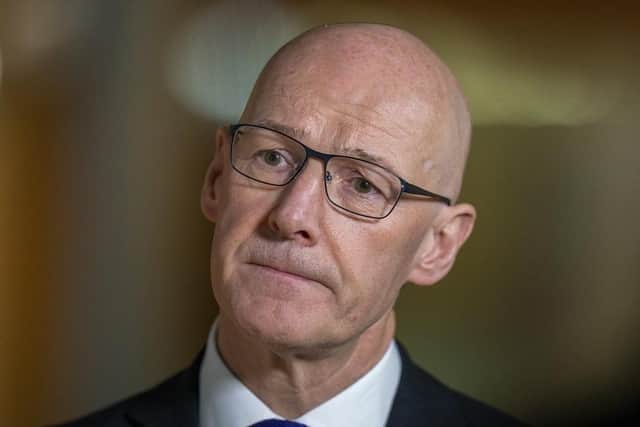Scottish budget: Vital services could be ‘stopped’ by councils facing funding crisis, finance directors warn
In a stark letter sent to Deputy First Minister John Swinney, the directors of finance at all 32 councils said there would be “significant consequences'' unless more money was allocated. They warned the most vulnerable members of society would be hard hit otherwise.
The directors said the situation facing councils in 2023 and beyond was “unprecedented”, with those in local government facing up to “tough choices”. Those decisions, they pointed out, will “impact the services that the public rely upon”.
Advertisement
Hide AdAdvertisement
Hide AdHowever, public finance minister Tom Arthur said the Scottish Government was “treating councils fairly” and providing a real terms increase of 6.3 per cent to local authority budgets this year. He also said the UK Government’s fiscal statement last month “did little” to reflect the financial challenges being faced by local authorities and the wider public sector.
It comes just a fortnight before Mr Swinney, also the acting finance secretary, is due to deliver one of the most important budgets in the history of devolution, as the Scottish Government seeks to mitigate rising inflation and demands across the public sector for better pay deals.
While the issue of council funding has been a long-running issue in Scottish politics, the urgent tone of the letter sent to Mr Swinney – added to the fact it has been sent by directors, not elected representatives – marks a significant escalation. It is understood to be the first time all 32 council finance directors have written a joint letter about such matters.
The correspondence, sent on Thursday, emphasises that without extra funding, public-facing services, such as schools, social care and waste collection, would suffer. “The choices come down to reducing services, stopping services and ultimately, reducing the number of jobs,” the letter states. “This is bad news for individuals, families, communities and economies across Scotland.”
The finance directors also fired a warning to the Scottish Government to resist any attempts to “claw back” any funding that local authorities were reliant on, pointing out they were facing “over £1 billion of pressures in 2023/24”. Their letter explained to do so would cause “serious issues” not just for councils, but the communities they serve.


“Put simply, it will mean less money for school food, classroom support, family support, youth work, economic development, libraries and other key services that are critical to supporting the most vulnerable,” the letter states.
Earlier this year, the Accounts Commission said councils faced "significant" financial challenges amid funding cuts handed down by SNP ministers. The public spending watchdog found local government funding had reduced by 4.2 per cent in real terms between 2013/14 and 2020/21, once dedicated Covid-19 funding was excluded. “This demonstrates that local government funding has been reduced by proportionately more than the rest of the Scottish Government budget over this period,” its report said.
That long-term trend is one seized upon by the local authority finance directors in their letter, which emphasises that councils have delivered a range of new policy initiatives over the past five years, even though they “have not always been fully funded over the longer term”.
Advertisement
Hide AdAdvertisement
Hide AdIt also states: “In responding to historic financial challenges, councils have managed to deliver balanced budgets against the context of real-terms cuts. Such challenges were set during times of low inflation and relatively stable demand. To continue such a model of funding against the backdrop of such exceptional circumstances places councils, and the services they deliver, at peril.”
The letter, while acknowledging a “shared appreciation” of the financial pressures at every level of government, asks Mr Swinney to reduce what the finance directors describe as “the bureaucracy over small pots of monies”, and argues councils should have “full autonomy” over how to disperse funding.
Daniel Johnson, Scottish Labour’s finance and economy spokesman, said: “This damning letter lays bare the damage the SNP have inflicted on local services. The SNP have been a conveyor belt of austerity for years, raiding local budgets to pay for their vanity projects, and now there is nothing left to cut.
“Local councils are at breaking point, and it is not just because of the current economic crisis – it is down to years of neglect and billions of pounds worth of cuts by this government. Councils have also faced a funding squeeze in recent years and senior figures in the sector fear another tight settlement could push them to the brink.”
Responding to the letter, Mr Arthur said: “We are doing everything within our power to support people, public services and the economy during the cost-of living crisis.
“The Scottish Government is treating councils fairly and providing a real terms increase of 6.3 per cent to local authority budgets this year. Scotland’s settlements from the UK Government have suffered a decade of austerity, with average real terms cuts of over 5 per cent equating to a loss of £18bn. Despite this, local authority revenue funding is £2.2bn or 22.9 per cent higher in cash terms in 2022/23 than it was in 2013/14.”
Comments
Want to join the conversation? Please or to comment on this article.